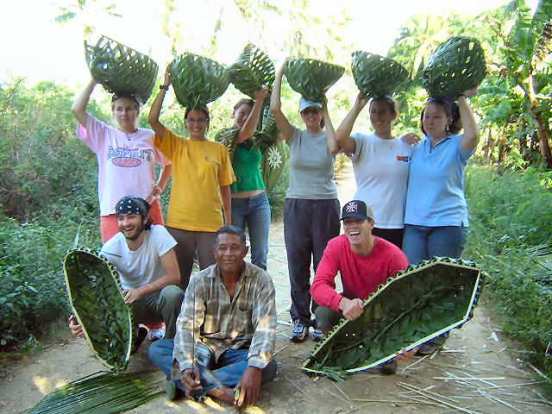Part One:
Ethnography is undergoing a remarkable efflorescence, both outside anthropology and within. This is coupled with an increased interest in ethnographic training. In the last few years, the US-based National Science Foundation [NSF] awarded several grants for training in ethnographic methods. I am reporting here about a particular ethnographic field school which, to the best of my knowledge, is unique.
1) exactly how does this field school differ from most ethnographic field schools?
Emphasis on participant observation,
taught (in part) by observing participants:
The Ethnographic Field School: Tonga, was collaboratively designed with the village residents where the field school was to take place.
In the early stages of the project development, I travelled to a village where I have had ongoing and deep relationships for over a dozen years. In town meetings, small group and individual meetings with village elders, and with members of the women’s development committees, we strategized about questions related to pedagogy and content: how and what to teach students who might become ethnographers in the future? I had my own ideas about criteria, but I wanted the hosts of the school, and the people usually relegated to the role of ‘observed’ and ‘interviewed’ to say what and how they wanted the students to learn.
We agreed that the underlying principles of the school should be as follows:
- Fieldschool would provide an experientially rich entré to doing ethnography in the ‘classic’ sense.
- Students should enjoy the experience.
- Village and island residents should enjoy and benefit from the Fieldschool.
- Students would acquire respect for Tongan culture, society and people.
- Students would appreciate the covenant of reciprocity and respect that underlies the long-term ethnographic encounter.
Building on these principles, we agreed that key elements of the Fieldschool would be:
- Cultural orientation and lessons in social etiquette prior to staying in the village.
- Classes on ethnographic ethics, mapping, kinship, participant observation, interviewing, visual and written field notes, Tongan culture, history, economy, politics, ecology, fishing, farming, textile-making, child-rearing, ceremony and language.
- Classes in anthropology to be taught by academic professor, classes on Tongan ethnography to be taught by Tongans.
- Tongan culture experts identified as potential interviewees or invited to teach in their areas of expertise to be paid or offered honoraria.
- Students homestay in the village; one student per family; they participate in household chores as if a son or daughter of the household.
- Fieldschool to re-imburse the village, each homestay family, and provide tranlation assistance to students.
- All ethnographic information recorded by students during the fieldschool to remain unpublished.
Based on these meetings, I drafted a field school proposal, and submitted it to the Study AbroadProgram at the University of Hawai‘i at Mānoa. When the proposal was accepted, and with financial support from the Centre for Pacific Islands Studies, I hired a particularly skilled and well-respected Tongan woman as Field School Assistant, to help make arrangements, coordinate travel, translate documents, and act as curriculum development partner.
Thus, from the outset, the fieldschool was participatory, culturally-sensitive in design and action-research oriented. While the students learned to be participant observers, the villagers learned to be observant participants in the training of ethnographers. In essence, people most used to being the subjects of research were recruited as active educators of a future crop of anthropologists: In addition to acting as home-stay hosts, village residents were active teaching partners, providing guest lectures in the classroom, hands-on lessons in the gardens, reef, fishing boats and weaving houses, and interviews on subjects negotiated between student, villager and instructor. Perhaps most significantly, the villagers acted as evaluators of the students’ performance, contributing to the students’ final grades.
The most radical differences between the Ethnographic Fieldschool: Tonga and other forms of field school training lay in the privileging of local needs, and repositioning of knowledge, pedagogy, curriculum content, and authority to teach to those who are normally constructed as interlocutors rather than instructors.
To be continued in Part Two.

